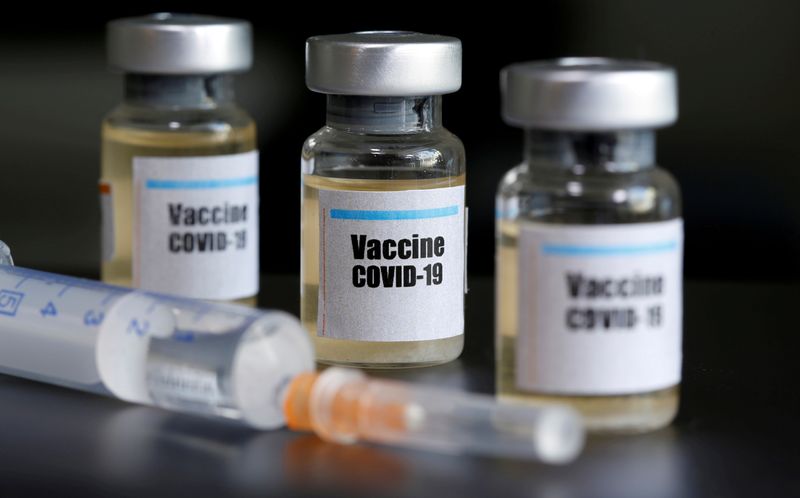(Reuters) – The following is a roundup of some of the latest scientific studies on the novel coronavirus and efforts to find treatments and vaccines for COVID-19, the illness caused by the virus.
J&J’s COVID-19 vaccine produces strong immune response
A single dose of Johnson & Johnson’s experimental COVID-19 vaccine produced a strong immune response against the novel coronavirus, according to interim results from an early-to-mid stage clinical trial released on Friday. The study, backed by the U.S. government, involves about 1,000 adults. The results were published on the medical website medRxiv in advance of peer review. Of the several hundred participants with data available for the interim analysis, the results showed that 98% had neutralizing antibodies, which defend cells from pathogens, 29 days after vaccination. However, immune response results were available from only 15 participants over age 65, leaving open the question of whether elderly people, one of the populations most at risk, will be protected as effectively as others. In participants older than 65, the rate of adverse reactions such as fatigue and muscle aches was 36%, much lower than the 64% seen in younger participants, the results showed, suggesting the immune response in older people may not be as strong. The researchers said more details on safety and effectiveness will follow when the study is completed. But there were no serious side effects, and based on the results so far, J&J kicked off a 60,000-person trial of the vaccine on Wednesday. A single shot, versus a rival two-dose approach being tested by Moderna Inc and Pfizer Inc, could simplify distribution of the vaccine. (https://bit.ly/334iHdH)
COVID-19 burden on U.S. minorities extends to children
Minority groups in the United States are disproportionately affected by COVID-19, and the disparities extend to children, doctors in Washington reported Thursday in the journal Pediatrics. In March and April, they tested 1,000 children for the novel coronavirus. Overall, roughly one in five children tested positive. But while 7% of white children tested positive, 30% of Black children and 46% of Hispanic children did so. After accounting for age, sex and family income, compared to white children, Black children had more than twice the odds of a positive COVID-19 test, and Hispanic had more than six times the odds. Black and Hispanic children were also far more likely to have been exposed to someone with COVID-19. The study could not identify causes of these disparities. But study co-author Monika Goyal of Children’s National Health System in Washington told Reuters the differences “appear to be driven by greater exposure to the virus. There’s nothing to indicate any type of genetic predisposition to COVID-19 based on race or ethnicity.” In many minority families, parents or caregivers may not have the luxury of telecommuting or staying home from work if they are sick, Goyal said, adding, “Our societal structures and policies that differentially impact communities based on economic and racial/ethnic lines in turn impact health outcomes. It is all connected.” (https://bit.ly/3ibxSpX)
Greasy creams help protect skin from PPE wounds
Greasy lubricants are best for protecting the skin from friction and tear injuries caused by hours of wearing personal protective equipment (PPE), according to researchers. Frontline healthcare workers and others who wear PPE for extended periods of time have been experiencing painful effects including skin tears, blistering, ulcers and hives. Workers have been advised to apply lubricants every half hour, but that is impractical during shift work and can increase the risk of infection for healthcare personnel. In a study published on Thursday in the journal PLoS One, scientists at Imperial College London found the best lubricants to use are those that do not absorb into the skin, creating a long-lasting layer of protection between skin and masks. In particular, they said, non-absorptive creams like coconut oil-cocoa butter beeswax mixtures and powders like talcum powder are most likely to provide PPE wearers with long-lasting skin protection. Study co-author Marc Masen said in a news release that commercial skin creams are often designed to absorb into the skin, but “a greasy residue is precisely what’s needed to protect skin from PPE friction.” (https://bit.ly/2G9hg4M)
Children with croup may need COVID-19 testing
During the pandemic, children with croup should probably be tested for COVID-19, according to doctors in Virginia, based on their experience with three youngsters with difficult-to-treat croup that was most likely due to infection with the novel coronavirus. All three children had the typical barky cough and difficulty breathing that characterize croup and required hospitalization. They were tested for 21 respiratory viruses and were positive only for the novel coronavirus. The croup was hard to treat. None of the children responded to the usual treatment. They did improve when they were treated with steroids, but improvement took much longer than expected. All three children eventually recovered. In a report published last week in the American Journal of Emergency Medicine, Paul Mullan of Children’s Hospital of the King’s Daughters in Norfolk and colleagues pointed out that the cause of croup is not usually investigated. But these days, they said, COVID-19 testing “should be considered given the prognostic significance and prolonged quarantine implications.” (https://bit.ly/2FT497W)
Open https://tmsnrt.rs/3a5EyDh in an external browser for a Reuters graphic on vaccines and treatments in development.
(Reporting by Nancy Lapid, Vishwadha Chander and Will Boggs; Editing by Will Dunham)



















